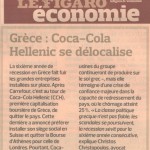Viewing posts from: April 2013
Oil Regulation (Part 2)
- posted in Energy
PART 2 – DOWNSTREAM
Α. GENERAL APPROACH
What is the general structure of the petroleum products’ market today?
In the refining sector only two companies 4 are active (HELLENIC PETROLEUM, MOTOR OIL) which produce homogeneous products and which are mainly targeted to the domestic market.
In the trade sectors there are approximately twenty (20) companies activated, which supply the service stations, the large consumers and the end consumers and which possess their own storage spaces.
In the field of retail distribution there are approximately 8,000 active service-stations, the majority of which bears the trademark of a trading company, while there are approximately 600 independent service-stations5, as well as a small number of service-stations located in Super Markets and exclusively supplying the end consumers.
Oil Regulation (Part 1)
- posted in Energy
INTRODUCTION
The petroleum market in Greece is facing significant issues, mostly due to the distortion of competition, smuggling and lack of substantial development in recent years. However, the market offers challenging opportunities to investors provided that much awaited changes – at both a regulatory as well as a business practice level – are followed through. The below report aims to present a brief, yet concise overview of the various aspects (sectors, risks, challenges, opportunities) of the Greek petroleum market.
The Coca-Cola leaves Greece
- posted in Quotes
LE FIGARO-Economie – 12/10/2012
Coca-Cola Hellenic se délocalise
La sixième année de récession en Grèce fait fuir les grandes entreprises installées sur place. Apres Carrefour, c’est au tour de Coca-Cola Hellenic (CCH), première capitalisation boursière de Grèce, de quitter le pays. Cette dernière a annonce préférer installer son siège social en Suisse et quitter la Bourse d’Athènes pour celle de Londres. Pourtant, Coca- Cola Hellenic est le deuxième embouteilleur de Coca-Cola au monde.
Les conséquences réelles de cette délocalisation resteront limitées- les usines du groupe continueront de produire sur le sol grec -, mais elle témoigne d’une crise de confiance majeure dans la capacité de redressement du pays, ou le chômage atteint 25%.

